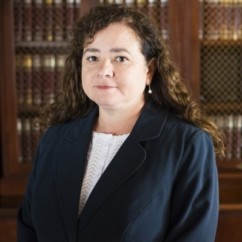Claudia Paz Y Paz
Leadership in Public Life, 2014

Focus Areas
Decades of corruption, violence, and impunity have worn away Guatemalans’ faith in the rule of law. Claudia Paz y Paz has begun to restore that faith. When she became Attorney General, the first woman to hold the position, Claudia overhauled the Attorney General’ s office. She believes that the law is intended to be a guardian of equality, justice, and peace, and she is determined to build a Guatemala where the law can fulfill its promise.
Remnants of a 36-year civil war and the absence of justice for its victims have prolonged a transition to stability in Guatemala. The country has one of the highest homicide rates in the world, and ranks third in murders of women. Drug cartels and politically connected crime syndicates use violence to control and terrorize communities, and many who have risen to top political positions have ties to organized crime. For years, the powerful have seen themselves as untouchable, and before Claudia, they mostly were.
Claudia is unassuming. She is short and soft-spoken, but resolute. A legal expert, lawyer, and activist, she’ s been working in the justice system for 18 years. She earned her doctorate in human rights and criminal law, served as a judge, and was the national consultant to the UN Mission in Guatemala. In 1994, Claudia founded the Institute for Comparative Criminal Studies of Guatemala, a human rights organization that promotes restorative justice and protects the rights of marginalized and discriminated groups during criminal proceedings.
Soon after becoming Attorney General in 2010, Claudia began setting records. More drug traffickers were arrested in the first six months of her term than in the previous 10 years. Under her leadership, five of Guatemala’ s 10 most wanted criminals were caught, and 10 times more cases of violence against women and homicide were resolved than in any previous administration.
Her strategy was to create systems that would endure. She introduced performance evaluations for all prosecutors, fortified a crime investigation unit to improve evidence analysis, and opened 24-hour courts to expedite proceedings of cases of violence against women.
In describing the legacy that she wanted to leave, Claudia said “the best and most important legacy we can leave is a strategic working method that on the one hand reduces impunity because crimes are cleared up and criminals are punished, while on the other it prevents further crimes from being committed.”
She was the first Guatemalan law enforcement official to pursue high-ranking combatants of the civil war for war crimes, and succeeded in the conviction of four soldiers for the 1982 massacre of 201 people in the town of Dos Erres. Claudia even took on former President Efrain Ríos Montt, who was convicted of genocide and crimes against humanity. “If serious crimes like these are not brought to trial, the public loses confidence in the justice system,” Claudia said of the case. Ten days after the verdict, however, Ríos Montt was free; his conviction was annulled, and a retrial has been delayed.
Claudia believes that all people are equal before the law. As Attorney General, she took on gangs, narco-trafficking, and organized crime. She also declared violence against women a government priority. Hundreds of bodies of murdered women are found brutalized each year, and only 2 percent of cases are solved. Claudia increased convictions, opened more prosecutors offices for women, and expanded victims’ access to comprehensive care.
Change takes time. As Attorney General, Claudia began dismantling a culture of impunity. She says she doesn’ t know if the changes she made will be permanent, or irreversible. But she does believe that in four short years, she and her team demonstrated that justice is possible.